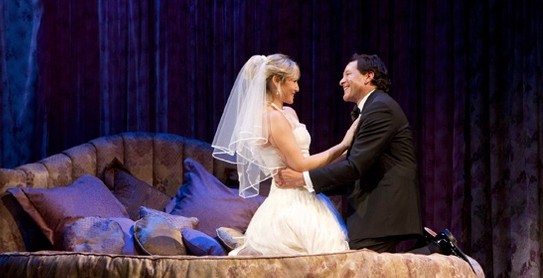
Doreen (Marlo Thomas) and Carla (Lisa Emery) try to figure out what to do with George in Elaine May’s GEORGE IS DEAD
Brooks Atkinson Theatre
256 West 47th St. between Broadway & Eighth Ave.
Opens Thursday, October 20, $65-$135 (October 14 performance reviewed)
www.relativelyspeakingbroadway.com
“I don’t have the depth to feel this bad,” Doreen (Marlo Thomas) says in the second of three one-act comedies that make up Relatively Speaking, which opened October 20 at the Brooks Atkinson Theatre. While the trio of short plays that deal with family — by writers much better known for their film work — might lack depth individually and as a group, two of the three don’t have much to feel bad about it. The evening opens with Oscar winner Ethan Coen’s (Fargo, No Country for Old Men) extremely slight Talking Cure, which is divided into two sections that feel like they were vignettes that Coen couldn’t think of how to use elsewhere so he threw them together here and hoped for the best. In the first part, Danny Hoch plays a patient in a mental institution trying to convince a psychiatrist (Jason Kravits) that there is nothing wrong with him. The second part reveals why he just might be crazy, flashing back to his parents (Katherine Borowitz and Allen Lewis Rickman) having an argument about Hitler. (Rickman replaced A Serious Man’s Fred Melamed, who left over creative differences with Coen. One can see why.)
After a four-minute pause, Elaine May’s (A New Leaf, Heaven Can Wait) George Is Dead begins, set in a small, cramped New York City apartment where Doreen barges in on Carla (Lisa Emery) in the middle of the night. Doreen announces that her husband has just died — and that she has left him in a Colorado hotel room because she doesn’t know what to do. A wealthy socialite wearing a glittering dress, Doreen has unexpectedly turned to the daughter of her old nanny (Patricia O’Connell), who is not exactly thrilled to suddenly have to take care of her former nemesis. Thomas gives a breathless tour-de-force performance as the ditzy, discombobulated Doreen; at one point she says to Carla, who is in the midst of an awful fight with her husband (Grant Shaud), “You’re so dear. Am I being too horribly demanding? Am I being awful? I can never tell.” The play’s final scene seems tacked on and unnecessary, but the rest of it is a small pleasure.

Nina (Ari Graynor) and Jerry (Steve Guttenberg) set in motion a farcical family drama in Woody Allen’s HONEYMOON MOTEL
Following a fifteen-minute intermission, Woody Allen’s (Annie Hall, Crimes and Misdemeanors) Honeymoon Motel takes over, a drawing-room farce that pays tribute to the Marx Brothers’ classic stateroom scene from A Night at the Opera. Jerry Spector (a solid Steve Guttenberg) and the much younger Nina (Ari Graynor) arrive at a wonderfully cheesy Vegas-like motel room (courtesy of set designer Santo Loquasto), apparently to consummate their marriage, but it turns out that Jerry is actually the stepfather of the groom (Bill Army) and has fallen in love with the sexy blonde. As the room slowly fills up with the whole mishpucha — Mark-Linn Baker and Julie Kavner as Nina’s dysfunctional parents; Caroline Aaron as Judy, the groom’s overbearing mother; Kravits as Jerry’s shrink; Hoch as the pizza delivery guy; and Richard Libertini as a tipsy rabbi — Allen lets the Borscht Belt one-liners flow, with more hits than misses. “What did I do? You two were planning on divorce anyway,” Nina says. “We were? It’s news to me,” responds Judy. “I never said divorce,” adds Jerry. “I was thinking of faking my own death.” After Judy calls Jerry’s best friend, Ed (Shaud), an enabler, Ed says, “Enabler? I was trying to talk him out of it when you came.” Judy: “You’re the first one that told him about sex in a Jacuzzi.” Ed: “I’ve never been in a Jacuzzi in my life.” Judy: “Well, he made me try it and we ended up dialing 911.” Jerry: “She accused me of waterboarding her.” Not exactly high-brow humor, but a lot of fun, even if Libertini’s rabbi falls flatter than a Kol Nidre pledge speech. Directed by John Turturro, who has appeared in films by Coen and Allen, Relatively Speaking is like a family reunion, complete with its fair share of ups and downs, touching moments and long-simmering arguments, at least one or two people you’d rather not see, and enough laughs to make you glad you went.